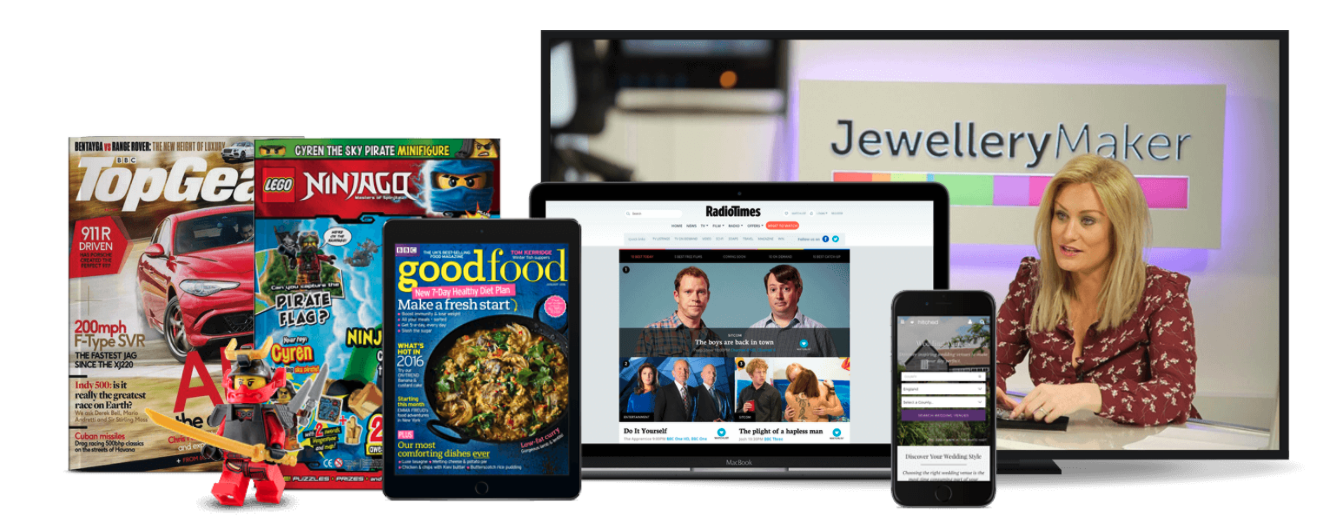Joined by FIPP CEO James Hewes and John Wilpers, senior director USA at Innovation Media Consulting and co-author of FIPP’s annual Innovation in Media World Report, Marshall stressed the importance of collaboration among publishers and suppliers as the industry undergoes its green revolution.

![]() Andy Marshall
Andy Marshall
Andy Marshall is the Group MD of Immediate Media and has previously worked for The European newspaper and Future, acted as an advisor at Plymouth University and is a Trustee at The Crafts Council.
Andy has spent over 30 years in the media industry, first as an accountant, before moving into commercial management and later being part of the team that founded Origin Publishing in the late 1990s, which is now Immediate Media.
“Working in partnership is absolutely crucial,” he said. “Everyone really is trying to do the best they can but, realistically, when we are working with partners in supply chains there are huge logistics and big capital commitments being made. It’s very difficult to do this quickly and it’s impossible to do on your own.
“We can’t do this in a vacuum and we can’t do this in competition with each other. I believe that approaching this in the spirit of collaboration and cooperation and in a spirit of openness and uncritical, non-judgmental dialogue would be a very positive way forward.”
A sustainable success story
Immediate has been true leading light in the battle for the media industry to become more sustainable. When subscribers receive their copy of Radio Times this month it will be wrapped in paper not plastic – the last of the group’s brands to make the transition. The change in material used to package Immediate’s subscriber copies has eliminated 100 tons of plastic packaging every single year.
Next, Immediate will endevour to eliminate as much of its plastic packaging from the newsstands. “We are always looking for new ways to present our products as attractively as possible without using plastic packaging,” says Marshall. “Where some of the cover gifts are bulkier and we have to use plastic, we’ll use a 30 per cent recycled polymer. We’re looking to reduce by 30 per cent our plastic packaging on the newsstand this year.”
The change in material used to package Immediate’s subscriber copies has eliminated 100 tons of plastic packaging every single year.
As the largest producer of children’s magazines in the UK, Immediate has aligned itself with Waitrose’s mission to remove unnecessary plastic within its ranges - the supermarket chain recently calling on publishers to replace plastic toys given away with its titles with more sustainable alternatives. In addition to ensuring the toys on its magazines are educational and durable, Immediate is helping to pioneer a recycling scheme using schools as pick-up points for playthings no longer needed.
Immediate has also done a full audit of its carbon emissions to give the company a detailed understanding of its carbon footprint. From that information it was possible to put together action plans to help reach challenging targets.
Consequently, since January this year, Immediate has been net carbon zero on Scope 1 emissions (emissions for which an organisation is directly responsible and have 100 per cent control over) and Scope 2 emissions (emissions for which they are indirectly responsible and have 100 per cent control over).
“At our offices what we are unable to eliminate, we are fully committed to balancing through carbon offsetting,” said Marshall. “Our aim is to reduce our emissions in line with what the UK needs to do over the next decade to 2030 (The Prime Minister announced late last year a new target to reduce the UK’s emissions by at least 68% by 2030, compared to 1990 levels).
That’s a massive task and will require a lot of work.
“Our overall footprint is about 35,000 tons of a carbon a year, so we have a long way to go. Scope 3 Emissions (emissions you could say you’re responsible for but over which you have limited control) are the biggest and involves paper production, distribution and printing - all of which will require us to not only work with other publishers and media owners, but also with all of our supply chain partners. If we can all work together over the next nine years we’ve got a shot at keeping pace of what’s needed.”
The Seven Rs
Immediate’s journey to greater sustainability started in earnest at the end of 2018 and start of 2019 when it set up a strategy sustainability group lead by Marshall, who reports to chief executive Tom Bureau. The company identified two key areas to ensure a greener future.
“The first is the impact that we have on the environment and natural world around us so we focus on our carbon emissions and use of plastic,” explained Marshall.
“The second part is the human impact that we have, particularly in our supply chain. So we also focus on the ethical issues on where our products are being sourced, who is manufacturing them and what safety guidelines there are within that.
“We have created a set of ethical standards and will only be using suppliers that are prepared to sign up to those ethical standards. Part of the process is regular audits, including non-scheduled audits.”
To bring structure to Immediate’s sustainability strategy, Marshall drew up the simple but effective ‘Seven R’ framework – Responsibility (the importance of having the support at senior level), Research, Recyle, Reuse, Reduce, Reconfigure and Report.
“It can be daunting to be leading in this area because it’s difficult to see the wood from the trees and focus on what really matters,” said Marshall. “Using the framework has helped us prioritise our responses, help allocate actions and resources to the rest of the business and help us understand the impact we’re having on the environment and the impact of the changes we’re making.”
Immediate’s commitment to real change is having a positive effect across the industry. By changing its subscriber packaging from plastic to paper and getting finishing lines and printers to reengineer a lot of their tooling and processes, other publishers are reaping the benefits.
“Our supply chain is able to commit to the capital costs of doing all this work, reengineering what they have to do because they are confident the demand will be out there,” Marshall pointed out. “That means it becomes cost effective for smaller players to be able to do the same things as well. That’s a win-win for everybody.”
“While eliminating a 100 tons of plastic packaging every single year is a small drop in the ocean compared to the many millions of tons we’ve produced, every little bit helps. Every little bit puts more pressure on various supply lines and they get that level of momentum going and we can quantify that saving, which is exciting for us.”
Where do we go from here?
While Covid-19 has not knocked the media’s drive towards greater sustainability off course, it has forced a few necessary backward steps, especially as staff start returning to offices.
“There will be health and safety protocols we will have to put in place,” said Marshall. “We have to revert to paper towels and move away from blow dryers. We will have to put our ceramic mugs away and revert back to disposal mugs to maintain a stringent health and safety regime.
“We are taking a small step back so what is crucial is to accept that you have to do that and then look at how you are disposing of those elements.”
81 per cent felt strongly that companies should help the environment, and among Millennials it goes up to 85 per cent.
Whatever stumbling blocks lie ahead, the media industry can’t afford to lose too much momentum. Reporting on his findings while putting together the Innovation in Media World Report, John Wilpers noted that sustainability is “not something people aren’t going to care one way or the other about”.
“Of global respondents, 81 per cent felt strongly that companies should help the environment and among Millennials it goes up to 85 per cent,” he added. “Among the older generation, this is two thirds.
“About 71 per cent of respondents said a company’s environmentally friendly business practices were more important than the price of the goods. That’s a big number and they will begin to vote with their dollars.”
As media groups continue on their green journey, it’s vital to keep customers informed about how the process is going.
“As media owners we have a huge amount of influence – we can communicate with our customers, help them recycle the materials that we are providing for them but also, it’s important to share information about the journey that we are going on,” said Marshall.
“Truth and transparency is a real commitment for us. We know there is a long way to go, we are on a journey and we are trying to bring a lot of people with us. It’s important to share the progress that you are making but just as important to share those areas where more work needs to be done and where help is needed.”
Writer: Pierre De Villiers
This article is part of the #PRINTISTHENEWBLACK series, a content collaboration with FIPP, showcasing the role of print in the modern media mix.

